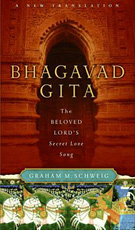Graham M. Schweig is the author and translator of Dance of Divine Love: The Rasa Lila of Krishna. After completing graduate work at the University of Chicago and Harvard University, he became associate professor of religious studies at Christopher Newport University and visiting associate professor of Sanskrit at the University of Virginia. Schweig spent three years on this lyrical translation of the Bhagavad Gita, which is India's most beloved holy book. This edition has the following features:
• Poetic translations in free-verse form.
• Foreign concepts and terms noted at the foot of the pages for easy reading.
• An overview of major themes in a brief informative introduction.
• A concluding essay for deeper understanding of the sacred texts.
• A glossary, index, and pronunciation guide of religious terms, ideas, and Sanskrit words.
• An appendix with the complete Sanskrit text.
Schweig sees this ancient Hindu poem as "the form of a dialogue that takes the soul on an inward journey culminating in the ultimate state of yoga, in which souls unite with the heart of God." Krishna is the chief divinity, and he wears many hats and plays many roles. Hindus worship him "as a sweet but mischievous child, as the closest friend, or even as the ultimate lover." The central message of the Bhagavad Gita is that individuals should at all times and in all situations act out of love. Schweig concludes:
"According to the Gita, yoga is not a reclusive meditation in some distant mountain hermitage; rather, the hermitage is found in one's heart, and in the hearts of others. The ultimate yoga for souls is to attain a state of full-heartedness — a heart that offers itself in unremitting, unconditional love in response to the divine yearning. This yearning, the greatest secret of all, is pronounced as "You are so much loved by me."
